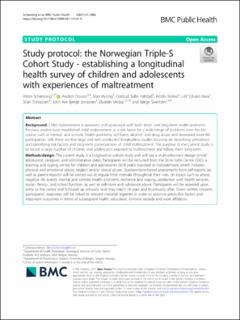| dc.description.abstract | Background
Child maltreatment is prevalent and associated with both short- and long-term health problems. Previous studies have established child maltreatment as a risk factor for a wide range of problems over the life course such as mental- and somatic health problems, self-harm, alcohol- and drug abuse and decreased work-life participation. Still, there are few large and well-conducted longitudinal studies focusing on describing prevalence and identifying risk factors and long-term consequences of child maltreatment. The purpose of the current study is to recruit a large number of children and adolescents exposed to maltreatment and follow them long-term.
Methods/design
The current study is a longitudinal cohort study and will use a multi-informant design (child/adolescent, caregiver, and administrative data). Participants will be recruited from the Stine Sofie Centre (SSC), a learning and coping centre for children and adolescents (≤18 years) exposed to maltreatment, which includes physical and emotional abuse, neglect and/or sexual abuse. Questionnaire-based assessments from self-reports (as well as parent-reports) will be carried out at regular time intervals throughout their lives, on topics such as abuse, negative life events, mental and somatic health problems, resilience and coping, satisfaction with health services, social-, family-, and school function, as well as self-harm and substance abuse. Participants will be assessed upon entry to the centre and followed up annually until they reach 18 years and bi-annually after. Given written consent, participants’ responses will be linked to relevant national registries in order to examine predictive factors and important outcomes in terms of subsequent health, education, criminal records and work affiliation.
Discussion
This study will examine short- and long-term consequences of child maltreatment across a range of health-related outcomes in a longitudinal perspective. Results from the current study might have implications for the development of preventive and intervention programs related to child maltreatment and the organization and follow-up of the services these children receive. The current study will hopefully contribute with knowledge of risk-factors, short- and long-term health-related and other issues that can contribute to practices aimed at improving the overall life-course for children and adolescents who have experienced childhood maltreatment. | en_US |

